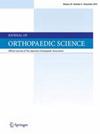Does prior rotator cuff surgery influence the outcomes and complications after reverse total shoulder arthroplasty in patients with cuff tear arthropathy or massive rotator cuff tear? A propensity score-matched study
IF 1.5
4区 医学
Q3 ORTHOPEDICS
引用次数: 0
Abstract
Background
The aim of this study was to compare outcomes and complications in patients with and without a history of prior rotator cuff surgery who underwent reverse total shoulder arthroplasty (RTSA).
Methods
Two-hundred and nine consecutive patients who had undergone RTSA for rotator cuff insufficiency with a minimum 12-months follow-up period were reviewed. A total of 35 patients with a history of prior rotator cuff surgery were made the study group (PS group). Using propensity score matching for age and sex, these patients were matched 1:3 with a control group of 105 patients with no history of prior surgery (NPS group). The mean follow-up period was 41.4 months.
Results
Both groups showed a significant improvement of clinical scores and range of motion after RTSA. The PS group showed a significantly higher final visual analog scale (VAS) pain score compared with the NPS group (P = 0.020). The PS group showed a significantly higher incidence of acromial stress fracture compared with the NPS group (17.1% vs 4.8%, P = 0.018), but no significant difference in the overall complication rate was observed (25.7% vs 13.3%, P > 0.05). The PS group showed a significantly higher reoperation rate compared with the NPS group (14.3% vs 1.9%, P = 0.004).
Conclusions
Our study demonstrated that a history of prior rotator cuff surgery was associated with a high incidence of acromial stress fracture and reoperation after RTSA as well as a high final VAS pain score, although satisfactory clinical outcomes after RTSA were achieved in both groups.
先前的肩袖手术是否会影响肩袖撕裂关节病或肩袖大面积撕裂患者反向全肩关节置换术后的疗效和并发症?倾向评分匹配研究。
背景:本研究旨在比较接受反向全肩关节置换术(RTSA)的既往有肩袖手术史和无肩袖手术史患者的治疗效果和并发症:本研究旨在比较接受反向全肩关节置换术(RTSA)的有肩袖手术史和无肩袖手术史患者的治疗效果和并发症:研究回顾了连续接受反向全肩关节置换术治疗肩袖功能不全并至少随访12个月的29名患者。共有 35 名曾接受过肩袖手术的患者被列为研究组(PS 组)。通过年龄和性别倾向得分匹配法,这些患者与由 105 名既往无手术史的患者组成的对照组(NPS 组)进行了 1:3 匹配。平均随访时间为 41.4 个月:结果:两组患者在接受 RTSA 治疗后,临床评分和活动范围均有明显改善。与 NPS 组相比,PS 组的最终视觉模拟量表(VAS)疼痛评分明显更高(P = 0.020)。PS组肩峰应力性骨折的发生率明显高于NPS组(17.1% vs 4.8%,P = 0.018),但总体并发症发生率无明显差异(25.7% vs 13.3%,P > 0.05)。PS组的再手术率明显高于NPS组(14.3% vs 1.9%,P = 0.004):我们的研究表明,既往肩袖手术史与肩峰应力性骨折发生率高、RTSA术后再次手术率高以及最终VAS疼痛评分高有关,但两组患者在RTSA术后均获得了满意的临床疗效。
本文章由计算机程序翻译,如有差异,请以英文原文为准。
求助全文
约1分钟内获得全文
求助全文
来源期刊

Journal of Orthopaedic Science
医学-整形外科
CiteScore
3.00
自引率
0.00%
发文量
290
审稿时长
90 days
期刊介绍:
The Journal of Orthopaedic Science is the official peer-reviewed journal of the Japanese Orthopaedic Association. The journal publishes the latest researches and topical debates in all fields of clinical and experimental orthopaedics, including musculoskeletal medicine, sports medicine, locomotive syndrome, trauma, paediatrics, oncology and biomaterials, as well as basic researches.
 求助内容:
求助内容: 应助结果提醒方式:
应助结果提醒方式:


